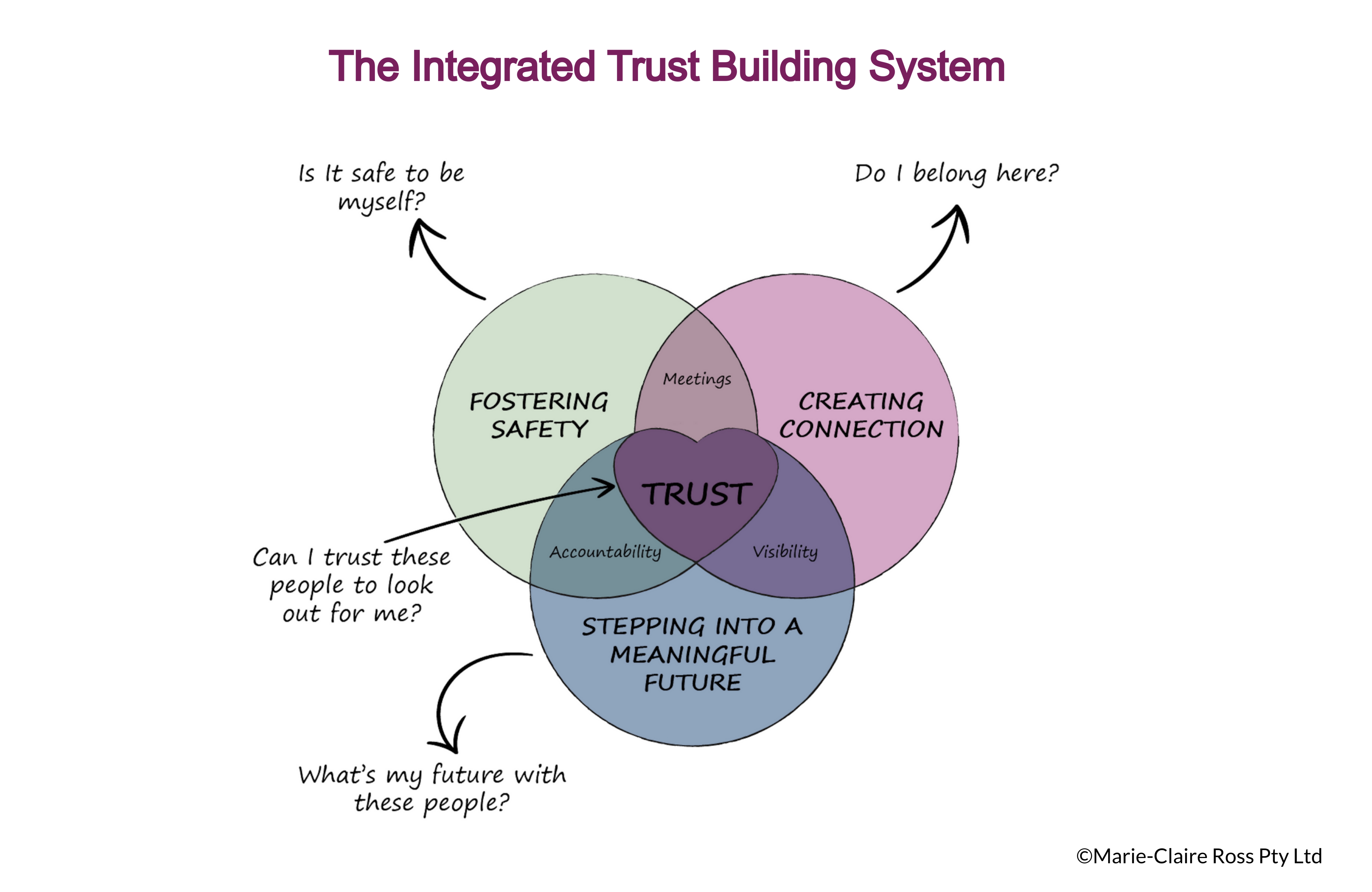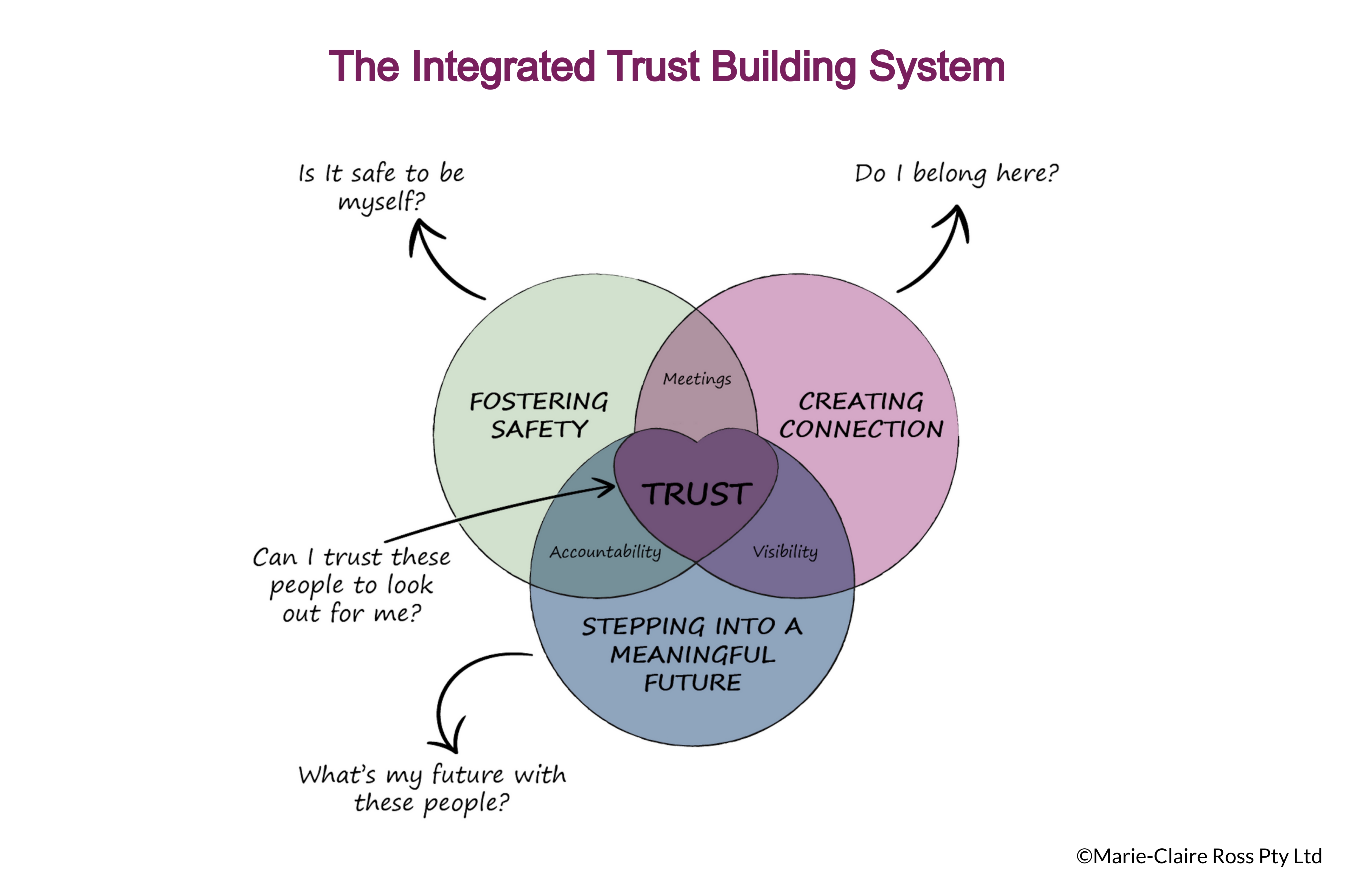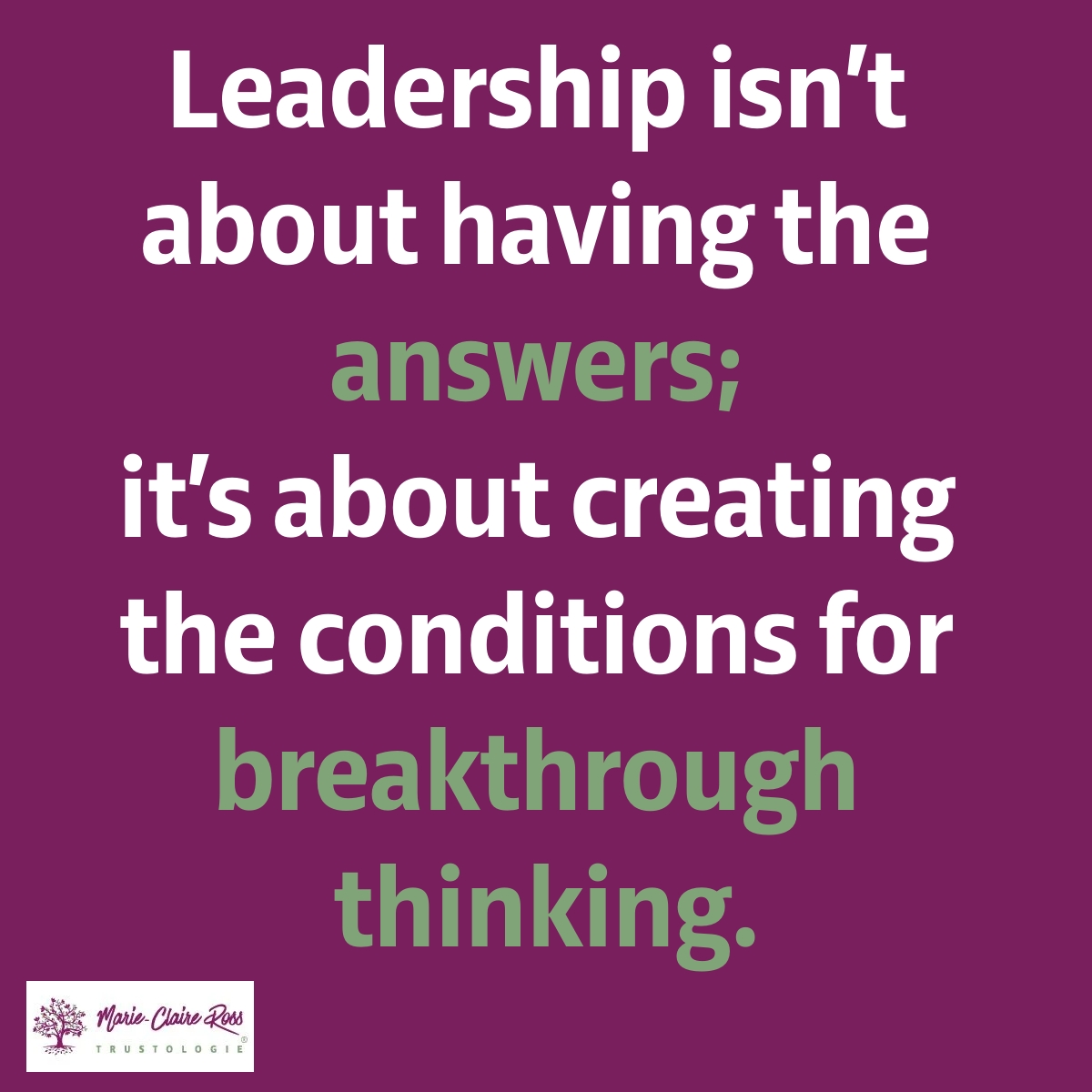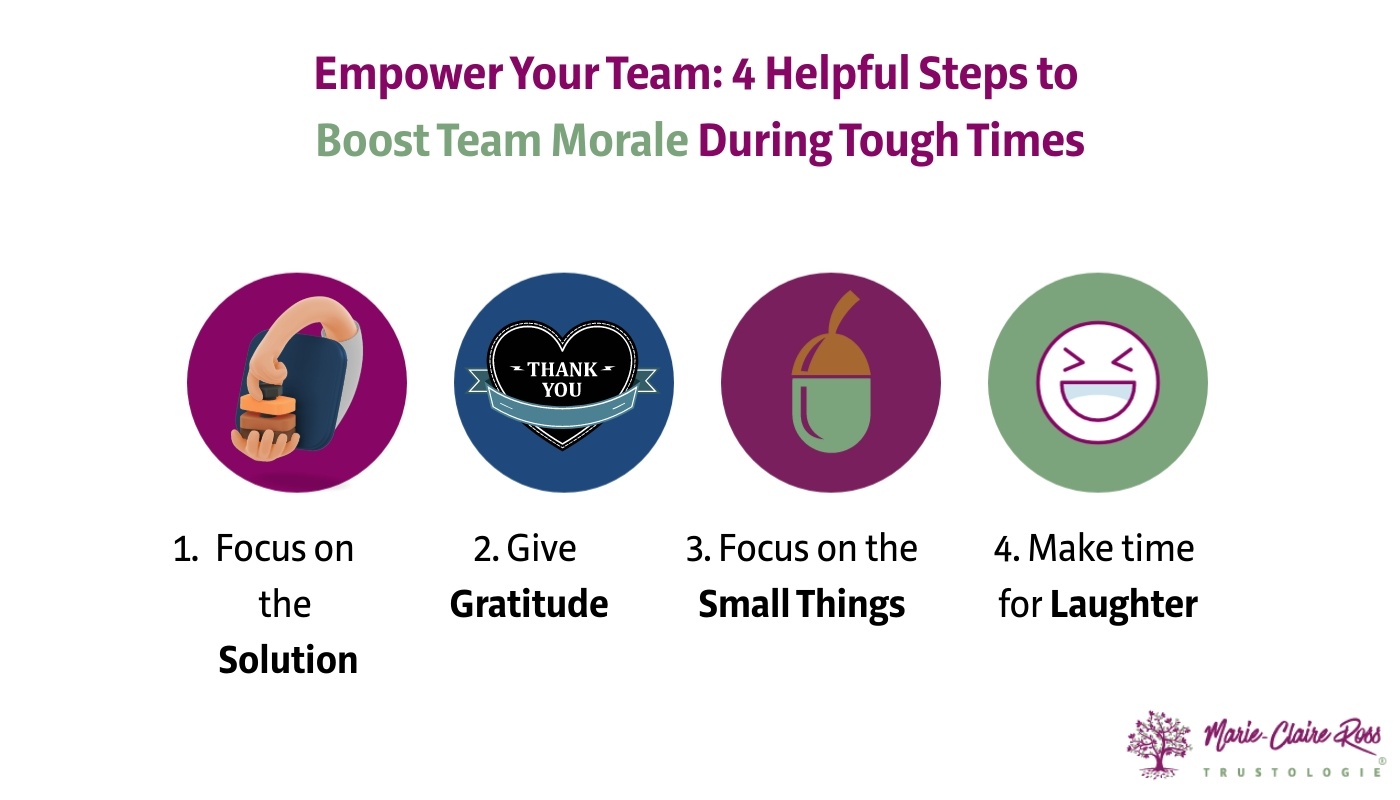8 min read
Beyond the "Why": 5 Coaching Secrets to Unlock Curiosity in Leadership
When my daughter was 17 months old, she discovered a superpower: the word “Why?”For the next two years, it was her response to almost everything.
Develop leaders, strengthen executive teams and gain deep insights with assessments designed to accelerate trust and performance.

Transform how your leaders think and perform with keynotes that spark connection, trust and high-performance cultures.

Explore practical tools, thought-leadership and resources to help you build trusted, high-performing teams.

Trustologie® is a leadership development consultancy founded by Marie-Claire Ross, specialising in helping executives and managers build high-trust, high-performing teams.

4 min read
Marie-Claire Ross : Updated on September 19, 2023

For decades, there has been a strong prevailing management belief to steer clear of employees' personal issues.
However, the pandemic has completely disrupted this conventional approach. As individuals were forced to work remotely and catch glimpses of each other's living spaces, combined with the anxiety stemming from the pandemic, being transparent about mental health has now become the standard practice.
Not only that, younger generations today view therapy as a normal part of life. With cost of living pressures and economic uncertainty hitting most people, managers are now expected to be proficient in "mental-health first aid."
While mental-health first aid is a tool being used at an individual level, leaders can also foster a team environment that is a source of support and encouragement, both in good and bad times.
This is where the Integrated Trust Building System from my book Trusted to Thrive can help (get a free chapter here).

As human beings, we are subconsciously worried about what other people think of us. Michael Gervais, a performance psychologist, calls it fear of other people's opinions (FOPO). It is an unhealthy, unproductive and irrational obsession that contributes to a lot of employee anxiety.
As a leader, it is your responsibility to create a thriving environment where everyone feels empowered to bring their best selves to work in service of a shared goal. A team environment that minimises the FOPOs.
According to neuroscience, there are three factors that our brains need to feel safe and trust the situation.
These include:
1. Feeling safe - This encompasses both psychological safety (being able to express your emotions/personality without any recriminations) and physical safety (not getting injured due to poor processes and clueless colleagues).
One of the most important ways to improve safety is to create a culture of learning.
Often, employees will feel anxious when working on tasks that are slow to achieving any tangible results. It feels like they are wasting time and disappointing others when they don't get to check off their task list and receive a dopamine hit.
Helping people to understand what they are learning is key, even when they seem to be getting negative results. It also means modifying your expectations from producing outputs to outcomes.
Take the example of an employees working on a proposal and being short-listed only to miss out on winning a tender. Hours of work can often seem wasted. Of course, what they have learnt in the process is key to winning other tenders. As a leader, you can help them unearth the gold.
That's why I like to say, "You don't build your expectations on the result, you build it on what you will learn."
2. Being connected
A sense of belonging is important for our wellbeing. Be intentional about your catch ups and time together. Use this time to not only connect everyone together, but to the purpose, and how work benefits others. Understanding the meaning of our contributions and that we are adding value to others is so good for our mental health.
3. Stepping into a meaningful future
We need to feel that the hard work is worth it and that we are being included in the future plans of the organisation.
Share a positive future that explains where you are now and how people will feel once the project or change is over.
Work with your people to see the career opportunities and the goals they can aim for to get them to the shiny new future.
Regularly monitor and discuss emerging trends to ensure that your team is prepared for what lies ahead.
Creating an environment where individuals feel secure, connected, and excited about the future requires showing them that they have support and that they are not alone. It involves working together as a team to achieve goals and aspirations.
And you do that by by emotionally signalling to people that they are an important part of the team through:
1. Meetings/One on ones - Be present, ask questions and listen. Use a structure in your interactions to ensure that your people's needs are being covered. You want people to feel that you are there for them through guiding them to improve their capabilities and empowering them to do great work.
2. Visibility - People believe what they can see. Visibility requires shining a light in lots of different directions. Without it, employees will automatically start to distrust their work environment. Transparency involves showing up, talking about what you’re doing, why you’re doing it, who is involved and how you’re progressing. It requires expecting visibility from your employees, as well.
3. Accountability - Create a culture of accountability in your team through letting people know that you trust them to do great work and that you believe they can perform to high standards. It requires modelling accountability through holding yourself, and others, to account. This means not tolerating poor performance that sends mixed messages about what's acceptable.
Great accountability involves using a clear delegation process so that people know what’s expected of them, in order to deliver to expectations. Otherwise, people tend to go into what I call fear of disappointing others (FODOs).
When you focus on these six factors, you create trust among your direct reports. It becomes the steady, beating heart of your team. People can subconsciously relax because everything feels okay. Sometimes you can almost see a visible shift in team morale.
And at the heart of trust is demonstrating that we care about others.
This involves sending out small subtle, emotional signals that the brain picks up that we are valued, appreciated, being seen for our gifts and heard.
Leaders do this in their interactions, whether they are aware of it or not. It's how you react and interact that makes a big difference to whether people feel that they can trust you, and the team, to back them up when things get tough.
Because building trust isn't about what we say. It's about our actions that match our words. You can't create trust by talking about it. You create trust by demonstrating it in your consistent actions that denote you care about the wellbeing of your team. That's why I like to say "you can't talk you way into trust, you have to behave your way into it."
And that's the key to boosting your team's morale.
How can you change your daily interactions so people believe that trust is at the heart of your team?
If you like this content, why not come and learn with a small group of upcoming leaders? Only 5 more days to go! The Tribe of Trusted Leaders - Leadership Development program starts this Monday 25 September. Join now before enrolments close.

8 min read
When my daughter was 17 months old, she discovered a superpower: the word “Why?”For the next two years, it was her response to almost everything.

11 min read
I have a friend who often finds herself at the mercy of her emotions. Recently, she called me to rehash a confrontation she’d had with a group of...

9 min read
True leadership presence isn’t a performance or a set of charisma hacks; it is the felt experience of who you are being in the room. By cultivating...

Times are challenging, obstacles are tough, and uncertainties loom on the horizon. The economic landscape is evolving in real time and will keep...
100.png)
We are at a critical inflection point in workplaces today.

Are your safety efforts are stuck in the past? Unfortunately, some companies think of safety as an afterthought ensuring that it is never fully...